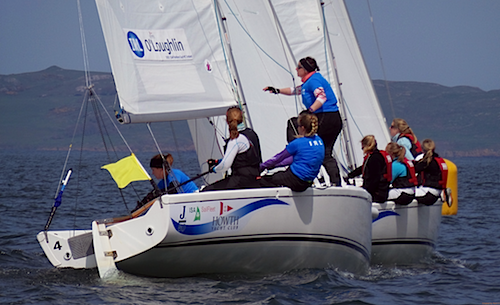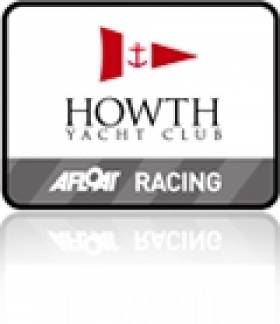Displaying items by tag: Nation's Cup
#matchracing – After four days of intense and challenging match racing in Howth Yacht Club this week, it was the experienced French teams who emerged as victors for the 2015 ISAF Nation's Cup European Finals in Ireland this week. La Rochelle's Pierre Rhimbault and his team took top position following a final windy day's racing in Howth in an event that also saw Pauline Courtois helm her 'Team France' to victory in the Women's series. An Irish crew skippered by Marty O'Leary were second overall.
Eleven participating nations enjoyed the racing in the mixed conditions that proved the forecasted mix of weather to be every bit as challenging as expected. The event was hosted by Howth Yacht Club and utilised eight J80 keelboats for three days of 'round robin' heats followed by a frenetically busy last day of semi-finals, finals and 3rd-4th place sail-offs. Rhimbault and his French team fought off a brave challenge from Ireland's Marty O'Leary and the UK's Mark Lees, both of whom are familiar visitors to Howth but could find no advantage in any 'local knowledge' against the experienced sailors from La Rochelle.
In the Women's event, Irish hopes rested with teams led by Howth's Diana Kissane and the Royal St George Yacht Club's Mary O'Loughlin but neither could make an impression on the Dutch entry of Klaatje Zuiberbaan (2nd) and eventual winner Pauline Courtois who excelled on the final day in the 25-knot southerly wind that tested boats and crews to the maximum.
At the prizegiving, HYC Commodore Brian Turvey thanked sponsors McPeake Auctioneers, event chairman Richard Kissane and all the competitors for taking part in such a lively continental championships and reminded the sailors that both Rhimbault and O'Leary as well as Courtois and Zuiberbaan now qualify for the intercontinental and World Finals in Vladivostok in July.The event chairman paid tribute to the work of the race management team under IRO David Lovegrove and the international jury led by Thibaut Gridel, also thanking ISA Sailfleet's Michael O'Connor and HYC's Kieran Jameson for the provision of their excellently maintained J80s.

Final standings provisional
ISAF Nation's Cup 2015 European Final Results
(Provisional)
10th May
Open Division:
1st FRA Rhimbault
2nd IRL O'Leary
3rd EST Sepp
4th GBR Lees
5th POL Wosinski
6th AUT Trippolt
7th FRA Follin
8th FIN Luhta
9th NED Korpershoek
10th NED Chu
11th SUI Mettraux
12th GER Maier-Ring
13th NOR Frissk
Womens:
1st FRA Courtois
2nd NED Zuiderbhaan
3rd SUI Bezel
4th IRL Kissane
5th IRL O'Loughlin
6th SWE Hager




























































